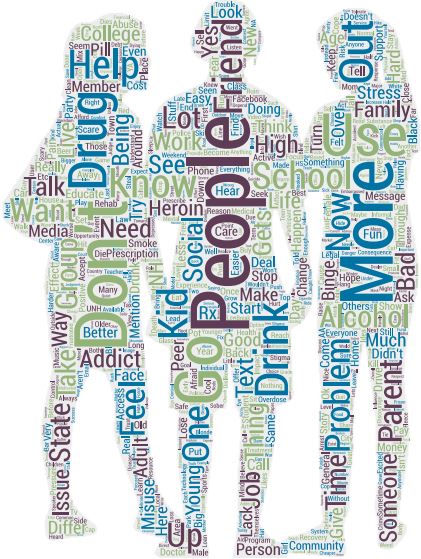New Report about Youth Attitudes and Perceptions on Drug and Alcohol Use to Be Used to Shape Prevention Efforts
Concord, NH – A new study titled The Voice of New Hampshire Young Adults on young people’s attitudes and perceptions surrounding substance misuse found that young people have a desire to be connected with their communities, but have trouble with availability and affordability of activities. Some expressed ambivalence about living in New Hampshire.
Many expressed concern about future job opportunities and worried that they were more likely to be burdened by financial hardship and might not be able to attain the same quality of life as their parents. There was awareness among young adults about the relationship between substance use and a sense of hopelessness.
They indicated that substance use/misuse is a method that some young people use as a buffer from external stressors and suggested that prevention messaging should emphasize coping mechanisms and that social media and texting are their preferred methods of communication.
The study was recently released by the New Hampshire Department of Health and Human Services’ Bureau of Drug and Alcohol Services.
This study, supported by funding from the Federal Substance Abuse Mental Health Services Administration, will serve as a blueprint for targeted prevention efforts in New Hampshire, assessed young adults’ risk behaviors, perceptions, and attitudes related to binge drinking and the illicit use of opioids (including prescription drugs and heroin).
The goals of the study were to identify opioid misuse prevalence among two primary groups, 18–20 and 21–25 year olds, in an effort to better understand the patterns of use relating to binge drinking and use of opioids. Participants were asked questions about their community, job opportunities, family structure, their sense of optimism about future opportunities, what they see as the most challenging issues in their lives, and what barriers they identify for a successful future.
They were also asked about their perceptions about the misuse of alcohol and drugs among people their age and their personal use of alcohol and drugs. Probably most importantly, they were asked their views on what they think would be the best way to engage young people about the misuse of alcohol and drugs and what strategies would be most effective in addressing these issues with them.
“According to SAMHSA, young adults (18–25 years old) in New Hampshire have some of the highest rates of illicit drug use in the country,” said Bureau of Drug and Alcohol Services Director Joseph Harding.
“The good news is that the Governor and legislature have made unprecedented resources available over this past year. That commitment, combined with funding made available from the Federal government allows the Department of Health and Human Services – working in concert with our Governor’s Commission on Alcohol and Drug Abuse Prevention, Treatment and Recovery – to develop and implement a full array of prevention, early intervention, treatment and recovery support services to combat our state’s opioid epidemic. The Young adult study will help us to better target services for young adults living in New Hampshire, which have the highest rates of misuse in the state,” he added.
The study ran from October 2015 to December 2015 with participation from the 13 Regional Public Health Networks under contract with DHHS, which with support from DHHS and the Department’s contracted Center for Excellence, conducted 57 focus groups with 366 young adults. The project also used geo-targeted Facebook ads to reach New Hampshire residents in this age range, and conducted an online survey that included the participation of more than 4,330 young adults living in New Hampshire.
Staff at the Department of Health and Human Services will work with the Governor’s Commission and their collective many external stakeholders to help communities across the state to utilize this data at the local level, emphasizing the importance of data driven messaging, and create targeted prevention strategies and interventions directed at this population that collectively seek to mitigate progression to misuse and addiction among young adults in New Hampshire.
To read a copy of the executive summary or the full report, visit BDAS online at http://www.dhhs.nh.gov/dcbcs/bdas/.





